Cost Of Living For a Student in Zambia 2026
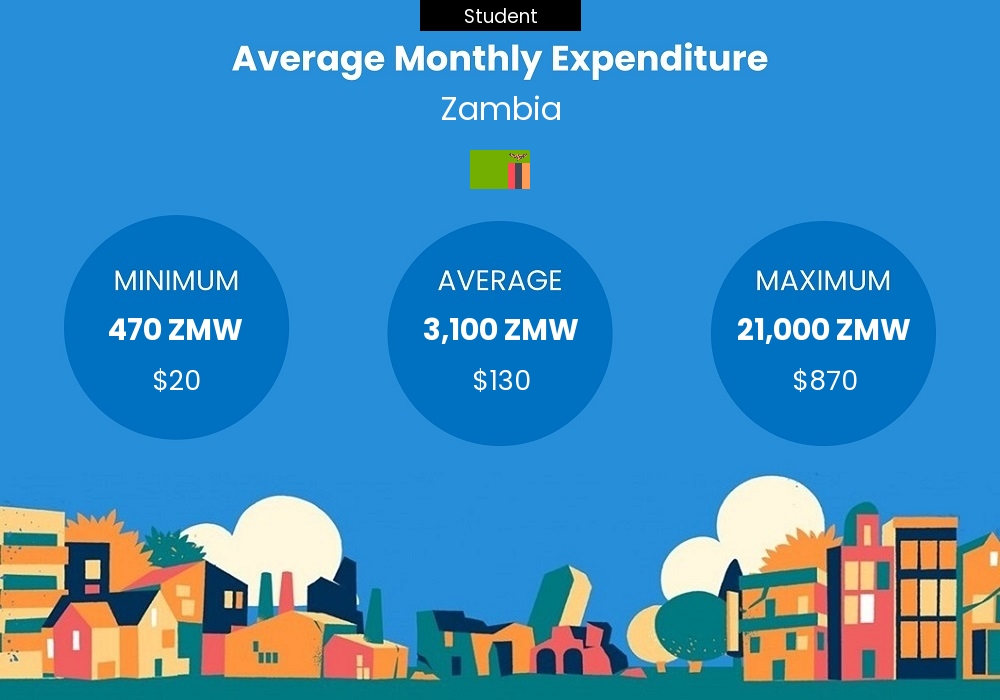
Average Monthly Expenditure
Currency: ZMW
Average monthly spending for students in Zambia
How much money does a student need in a month to survive in Zambia?
Students in Zambia spend around 3,100 ZMW per month on average. Depending on the lifestyle, a student can survive with a monthly budget as low as 470 ZMW or as high as 35,000 ZMW. Location is a very important factor and has a huge influence on expenditure and budget.
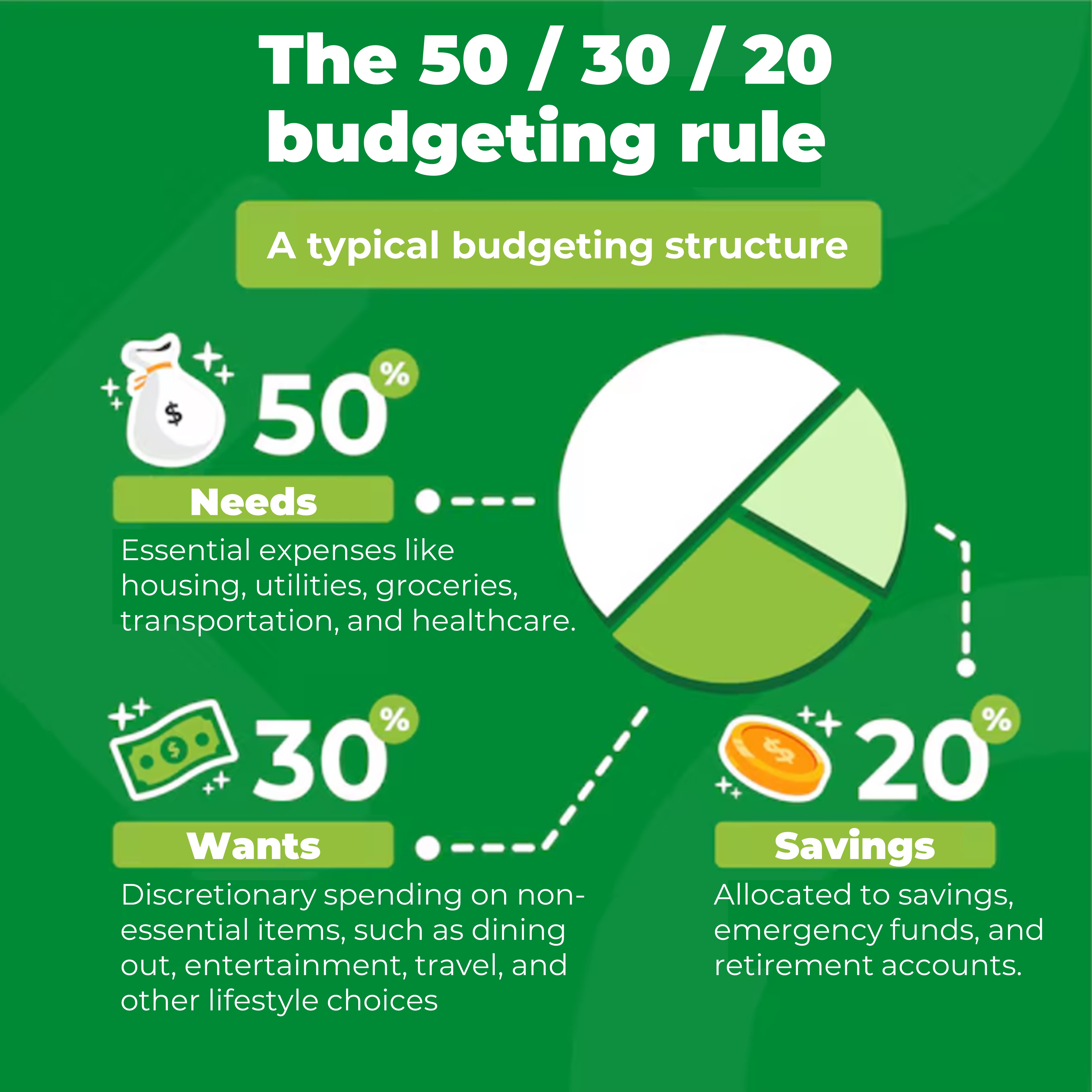
A typical and healthy budgeting structure
The 50/30/20 rule
Spending among different people can vary significantly based on factors such as their income, lifestyle,
location, and personal preferences. A commonly used guideline for budgeting is the 50/30/20 rule,
which suggests allocating your income into three main categories in the following percentages.
50% for needs and financial obligations
This category includes essential expenses like housing, utilities, groceries, transportation, and healthcare.
30% for wants and discretionary spending
This category covers discretionary spending on non-essential items, such as dining out, entertainment, travel, and other lifestyle choices.
20% for savings and emergency fund
This is the percentage that must be allocated to savings, emergency funds, and retirement accounts.
About financial planning, money management, and household budgeting
The 50/30/20 rule is used as a general guideline but may not be the best choice for all people. There are in fact many budgeting plans out there like the 70/20/10 and the 60/20/20 rules, all claiming to be the best. More important than all of this is to establish financial discipline by creating a budget tailored to your specific financial goals and situation. It is very important that your financial outflow be less than your income to maintain a healthy cash flow.
Prices and cost of goods and services in Zambia
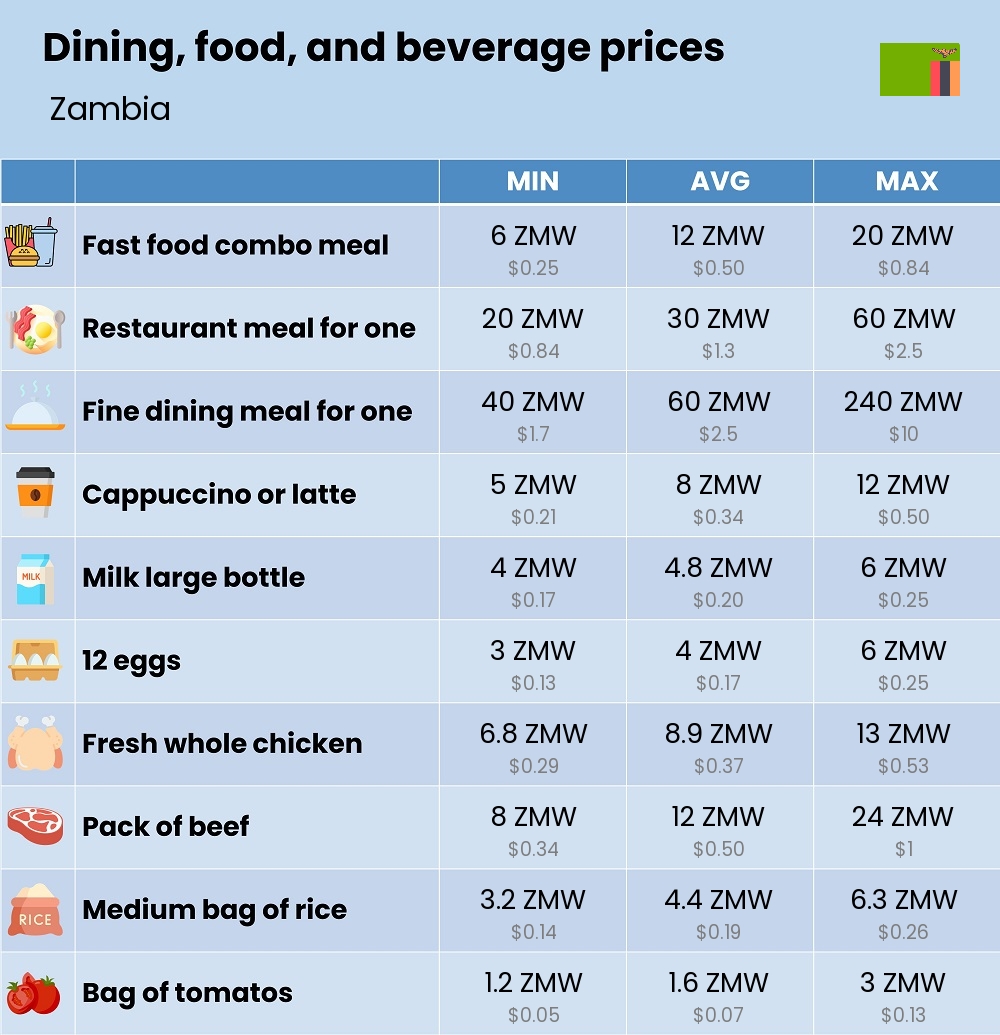
Dining, food, and beverages costs

Fast food combo meal

Restaurant meal for one

Fine dining meal for one

Cappuccino or latte
Grocery and market costs

Milk large bottle

12 eggs

Fresh whole chicken

Pack of beef

Medium bag of rice

Bag of tomatos

Bag of apples
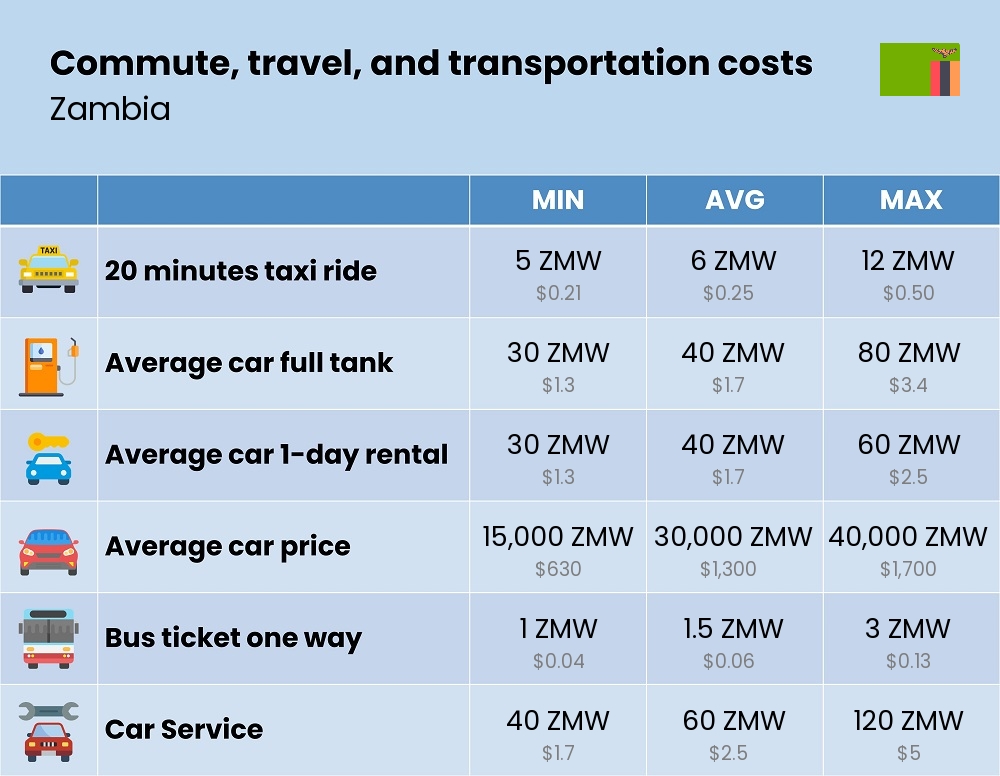
Commute, travel, and transportation costs

20 minutes taxi ride

Average car full tank

Average car 1-day rental

Average car price
| 15,000 ZMW | 30,000 ZMW | 40,000 ZMW |

Bus ticket one way
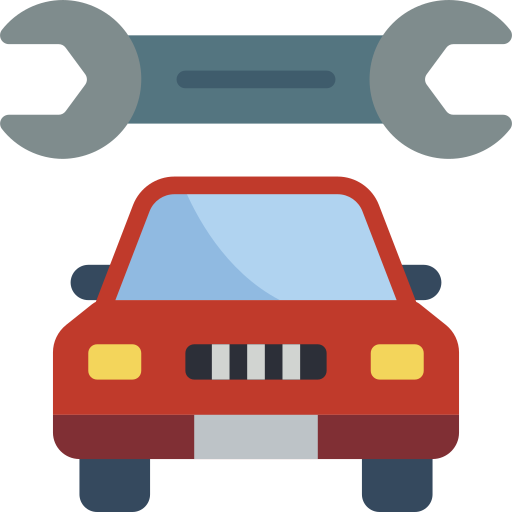
Car Service
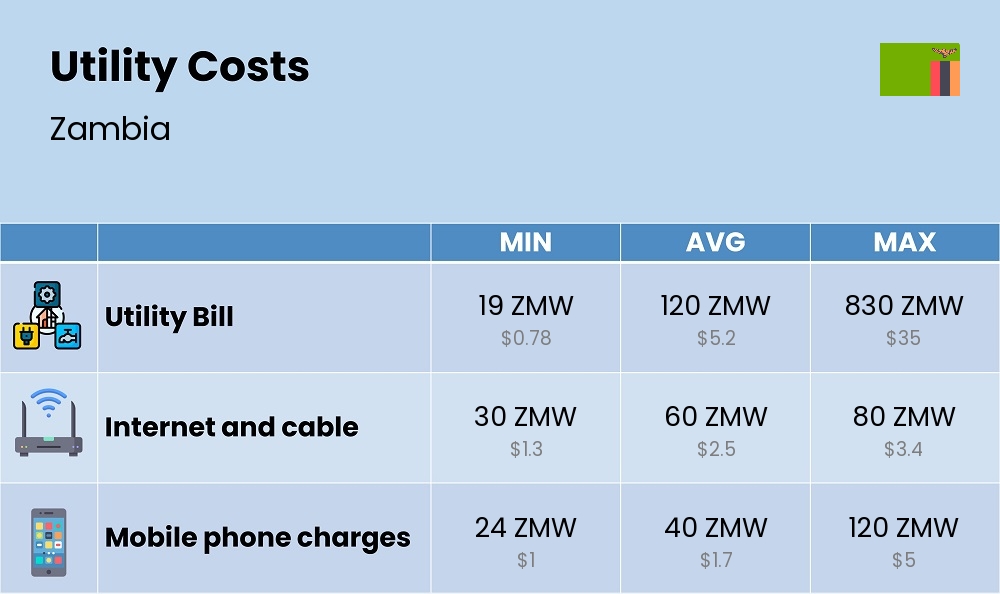
Utility cost (monthly)
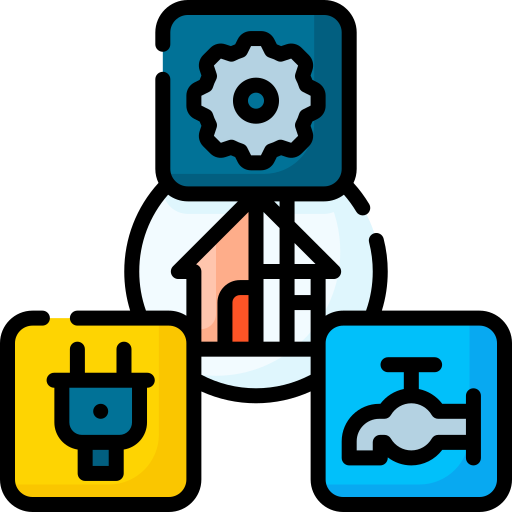
Utility Bill - Student

Internet and cable

Mobile phone charges
Leisure and activities costs

Movie ticket

One month gym membership
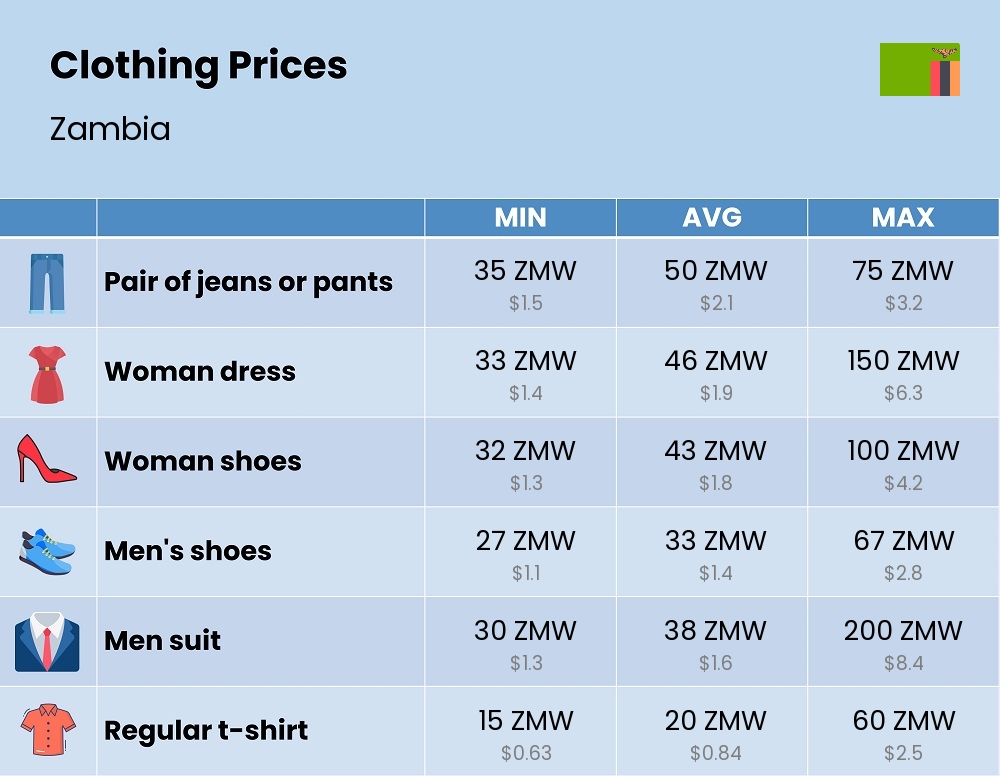
Cloths and accessories costs

Pair of jeans or pants

Woman dress

Woman shoes

Men's shoes

Men suit

Regular t-shirt
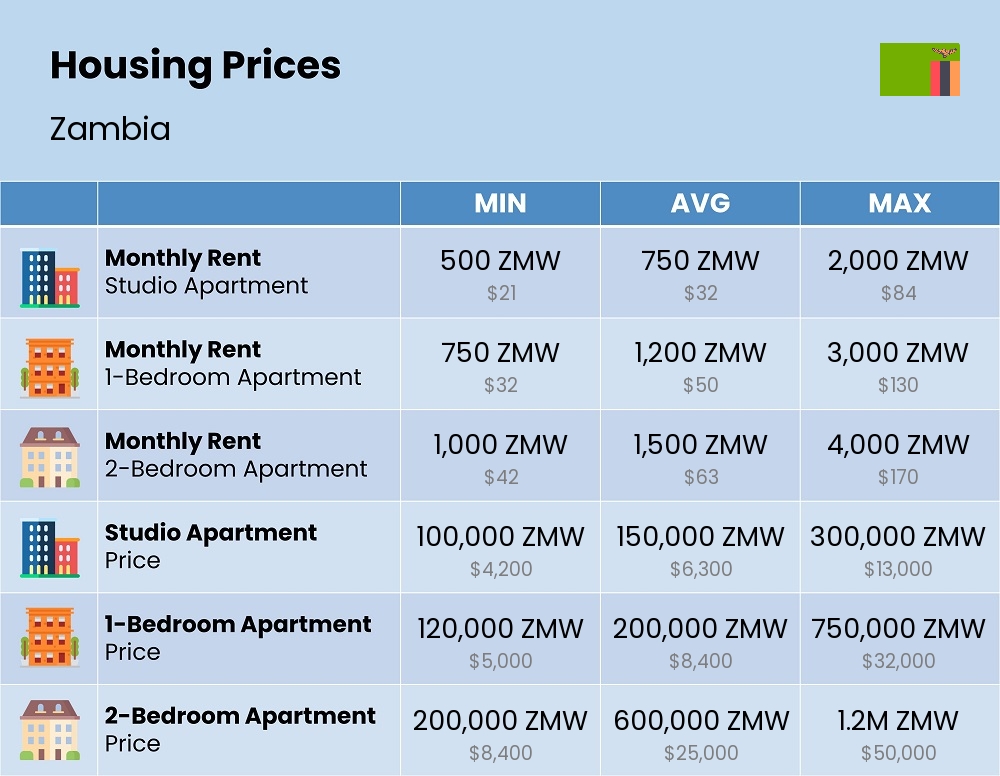
Housing costs / monthly rent

Studio apartment
| 500 ZMW | 750 ZMW | 2,000 ZMW |
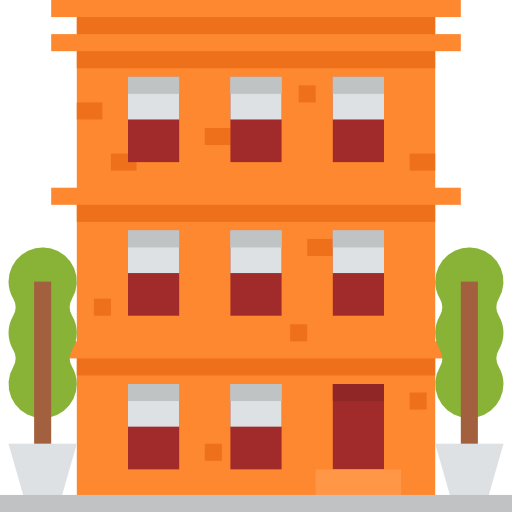
1-bedroom apartment
| 750 ZMW | 1,200 ZMW | 3,000 ZMW |
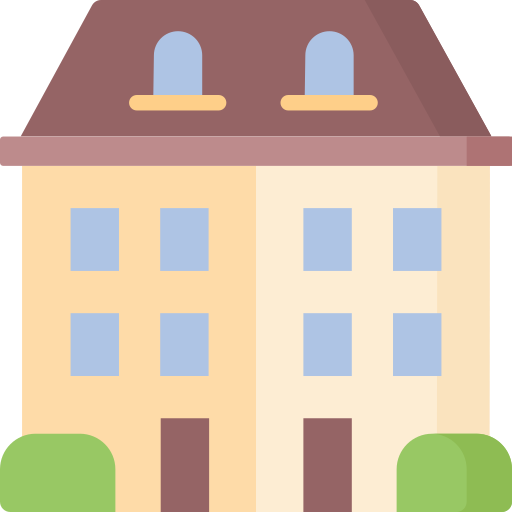
2-bedroom apartment
| 1,000 ZMW | 1,500 ZMW | 4,000 ZMW |
Housing costs / Buying

Studio apartment
| 100,000 ZMW | 150,000 ZMW | 300,000 ZMW |

1-bedroom apartment
| 120,000 ZMW | 200,000 ZMW | 750,000 ZMW |

2-bedroom apartment
| 200,000 ZMW | 600,000 ZMW | 1.2M ZMW |
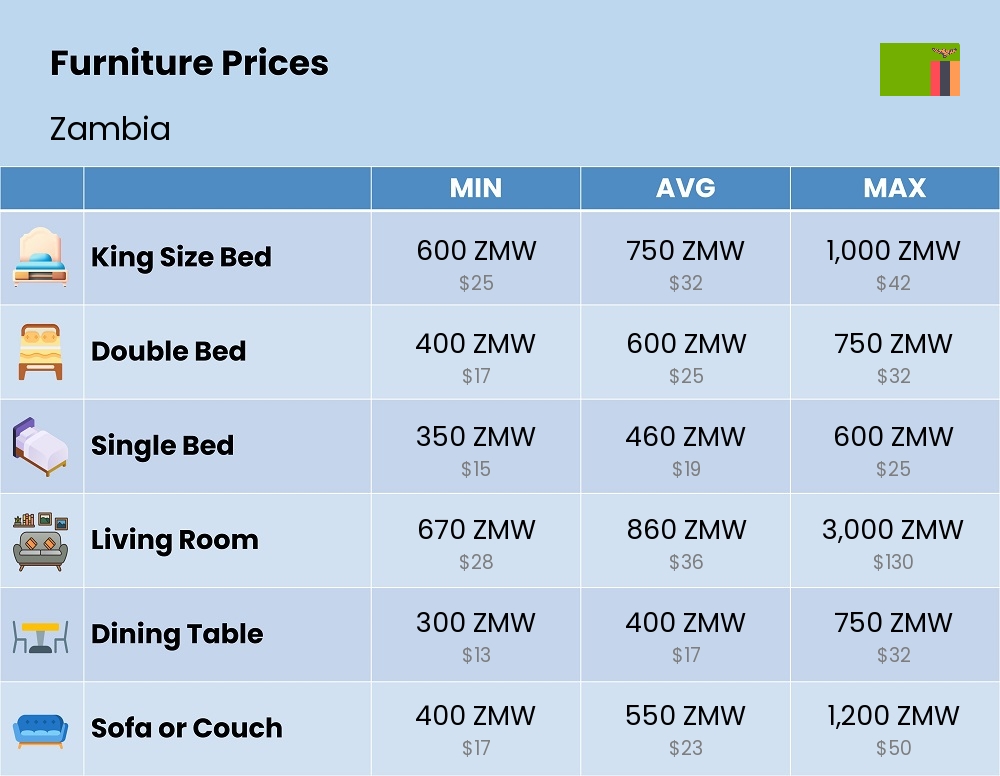
Furniture Costs

King Size Bed
| 600 ZMW | 750 ZMW | 1,000 ZMW |

Double Bed

Single Bed
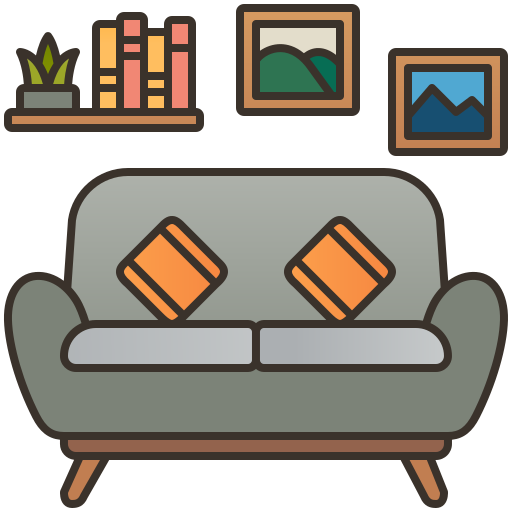
Living Room
| 670 ZMW | 860 ZMW | 3,000 ZMW |
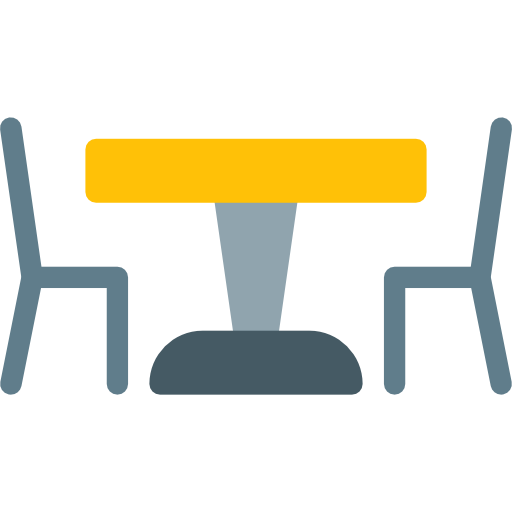
Dining Table

Sofa or Couch
| 400 ZMW | 550 ZMW | 1,200 ZMW |
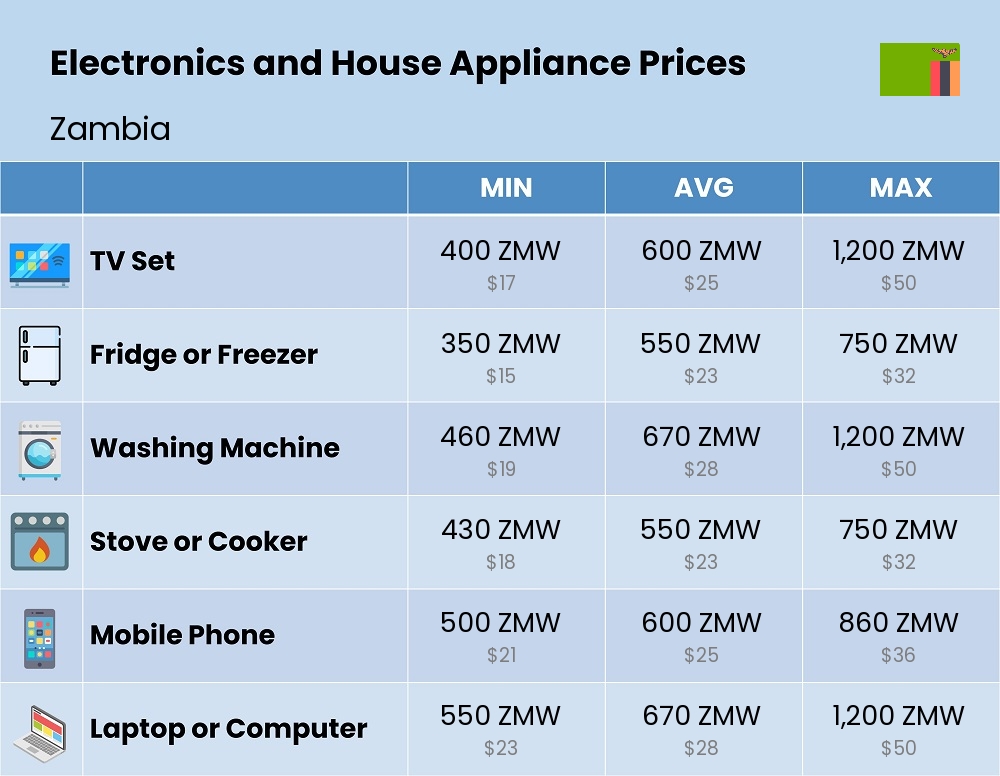
Electronics and House Appliance Costs

TV Set
| 400 ZMW | 600 ZMW | 1,200 ZMW |

Fridge or Freezer

Washing Machine
| 460 ZMW | 670 ZMW | 1,200 ZMW |
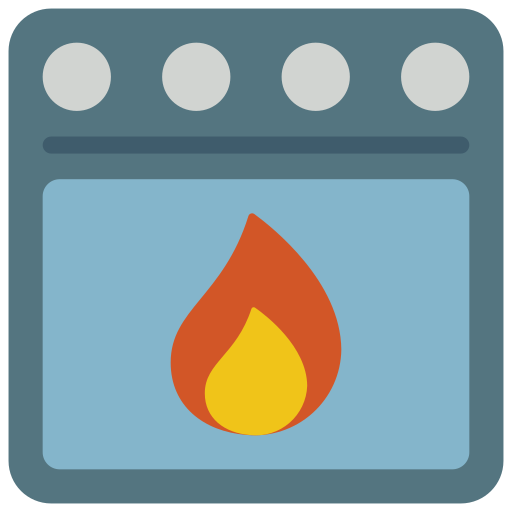
Stove or Cooker

Mobile Phone

Laptop or Computer
| 550 ZMW | 670 ZMW | 1,200 ZMW |
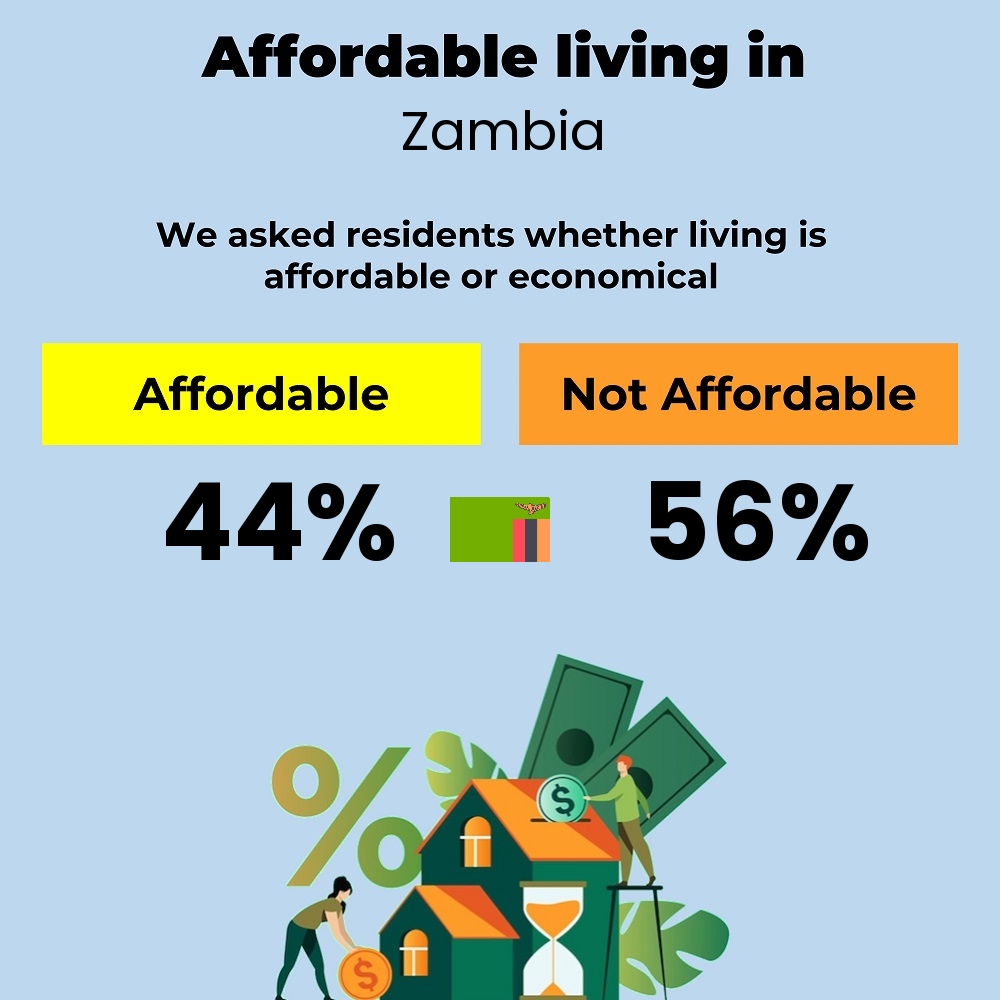
Affordable living in Zambia
Income and cost of living compatibility
We asked students one simple question and recorded their answers.
Is it affordable or economical to live in Zambia?
Around 44% of surveyed students think that living in Zambia is affordable with proper budgeting while 56% reported that it is just too expensive and not affordable even with frugality and thriftness.
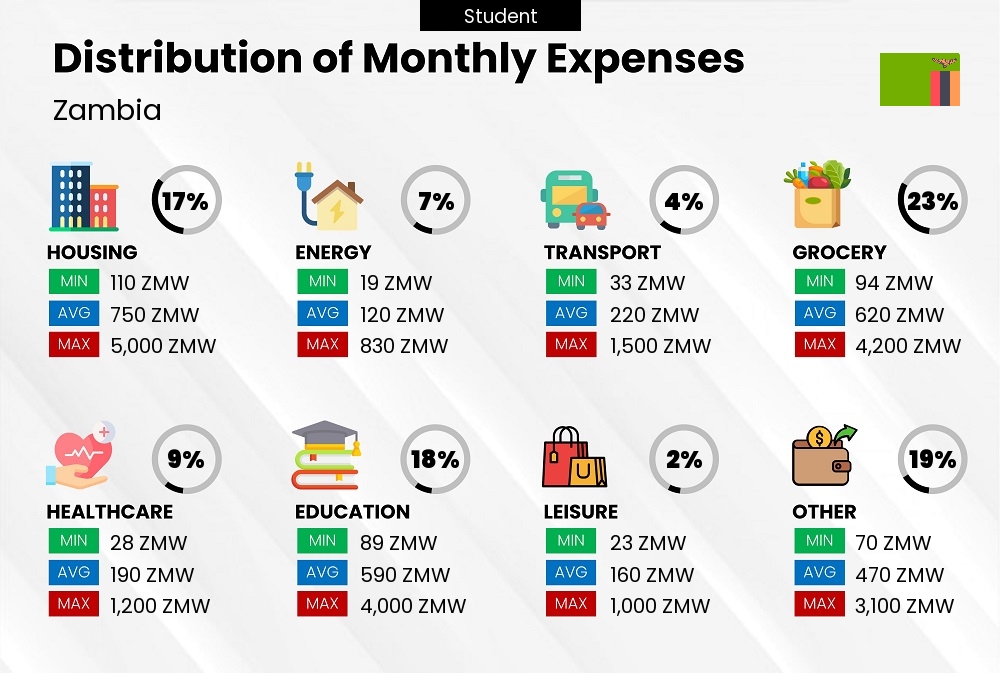
How do students spend their money in Zambia?
We asked thousands of students about their spending habits and expenditure break down.
Housing and accomodation expenditure for students
Accomodation Cost17%
17% of total expenses on average (12% to 23%)
| LOW | $4.7 110 ZMW |
| AVERAGE | $31 750 ZMW |
| HIGH | $350 8,300 ZMW |
| Per Month |
Students in Zambia typically spend from 12% to 23% of their total monthly expenditure on housing with 17% being the average. The average monthly spend on housing is 750 ZMW with expenditure ranging from 110 ZMW to 8,300 ZMW. This cost mainly goes for rent but it also includes other accommodation-related expenses.
Electricity, utilities, energy, water, internet, and mobile expenditure for students
Cost of utilities7%
7% of total expenses on average (5% to 11%)
| LOW | $0.78 19 ZMW |
| AVERAGE | $5.2 120 ZMW |
| HIGH | $58 1,400 ZMW |
| Per Month |
Utility expenditure like electricity, water, and gas in Zambia ranges from 5% to 11% of total expenses with 7% being the average for most students. The average monthly cost of utilities is 120 ZMW with 19 ZMW and 1,400 ZMW being the upper and lower limits for a student of four.
Transport, fuel, and commute expenditure for students
Cost of transport and fuel4%
4% of total expenses on average (4% to 10%)
| LOW | $1.4 33 ZMW |
| AVERAGE | $9.2 220 ZMW |
| HIGH | $100 2,400 ZMW |
| Per Month |
Fuel consumption and cost of transport depend heavily on whether a student resides near school and work, but roughly speaking a student would expect to spend from 33 ZMW to 2,400 ZMW in a month on commuting with 220 ZMW being the norm for most students. This means that money spent on transport constitutes about 4% of total spending on average but can go as low as 4% or as high as 10%.
Food, groceries, and basic shopping expenditure for students
Food and Groceries Cost23%
23% of total expenses on average (17% to 27%)
| LOW | $3.9 94 ZMW |
| AVERAGE | $26 620 ZMW |
| HIGH | $290 6,900 ZMW |
| Per Month |
The average outlay on groceries and basic houshold items for a typical student in a month in Zambia is 620 ZMW. The cost of groceries can range between 94 ZMW to 6,900 ZMW. Students spend on average about 23% on food and groceries with upper and lower bounds of 17% and 27% respectively.
Healthcare and medical services expenditure for students
Cost of healthcare9%
9% of total expenses on average (6% to 12%)
| LOW | $1.2 28 ZMW |
| AVERAGE | $7.9 190 ZMW |
| HIGH | $87 2,100 ZMW |
| Per Month |
Students in Zambia allocate 6% to 12% of their total monthly expenditure to healthcare including health insurance and out-of-pocket medical expenses. The average spending on medical services and clinic visits is around 9%. The range of medical expenses range from 28 ZMW to 2,100 ZMW with 190 ZMW being the norm for most students.
Leisure and shopping expenditure for students
Cost of leisure and shopping2%
2% of total expenses on average (2% to 6%)
| LOW | $0.98 23 ZMW |
| AVERAGE | $6.5 160 ZMW |
| HIGH | $73 1,700 ZMW |
| Per Month |
This category mostly contains discretionary or non-essential expenses but also some non-discretionary spending like furniture for example. The monthly expenses range from 23 ZMW to 1,700 ZMW with 160 ZMW being the average. Speaking of percentages, that equates to 2% to 6% of total expenses with an average of 2% for most students.
Education and schooling expenditure for students
Cost of education and schooling18%
18% of total expenses on average (11% to 23%)
| LOW | $3.7 89 ZMW |
| AVERAGE | $25 590 ZMW |
| HIGH | $280 6,600 ZMW |
| Per Month |
Spending on education can vary drastically between different students. On average, education constitutes 18% of the monthly expenditure of students with 11% and 23% being the lower and upper bounds respectively. The average reported education cost is 590 ZMW per month with 89 ZMW being the minimum spent amount and 6,600 ZMW being the maximum.
Other Expenses19%
19% of total expenses on average (13% to 25%)
| LOW | $2.9 70 ZMW |
| AVERAGE | $20 470 ZMW |
| HIGH | $220 5,200 ZMW |
| Per Month |
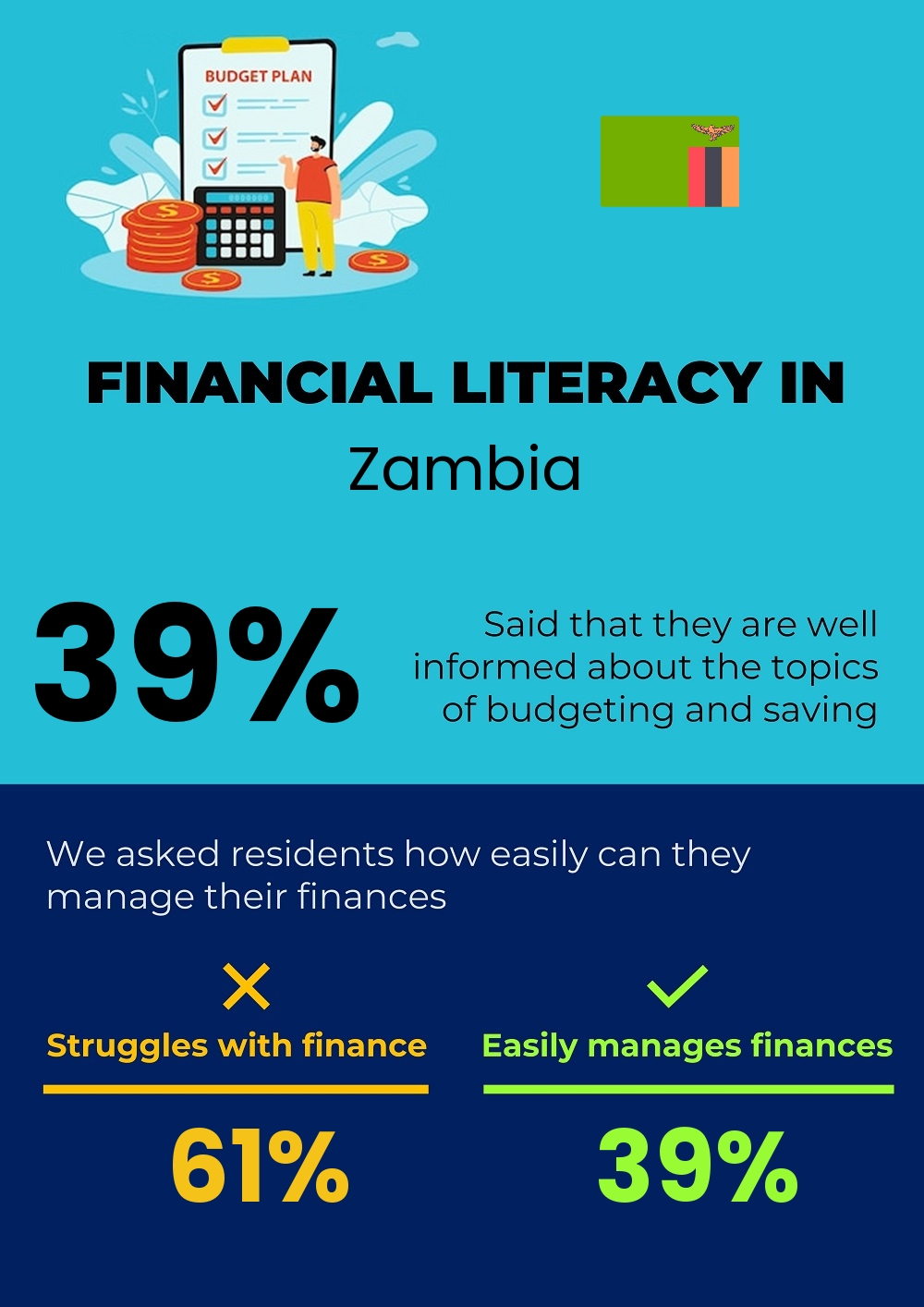
Financial Literacy in
Financial literacy is the knowledge of concepts and principles related to personal finance that allow individuals to make informed decisions regarding their money such as budgeting, saving, investing, borrowing, managing debt, financial risk management, and planning.
Financial Leteracy39%
We asked student guardians and parents in Zambia whether they acquired any adequate personal financial training in their lives. Approximately 61% of the people who participated in the survey said that they are not well informed about the topics of budgeting, saving, etc., and just manage things based on their own experience, while 39% said that they know about the general principles of personal finance from sources other than their own experience.
Difficulty in Budgeting and Financial Planning
We wanted to understand whether students of have problems or difficulties in managing their expenditures and savings so we asked people one simple question: do you struggle with your personal finances? 61% of the participants reported that they indeed struggle in creating budgets and in organizing their finances while 39% said that they have everything under control.
Struggles with finance61%
Easily manages finances39%
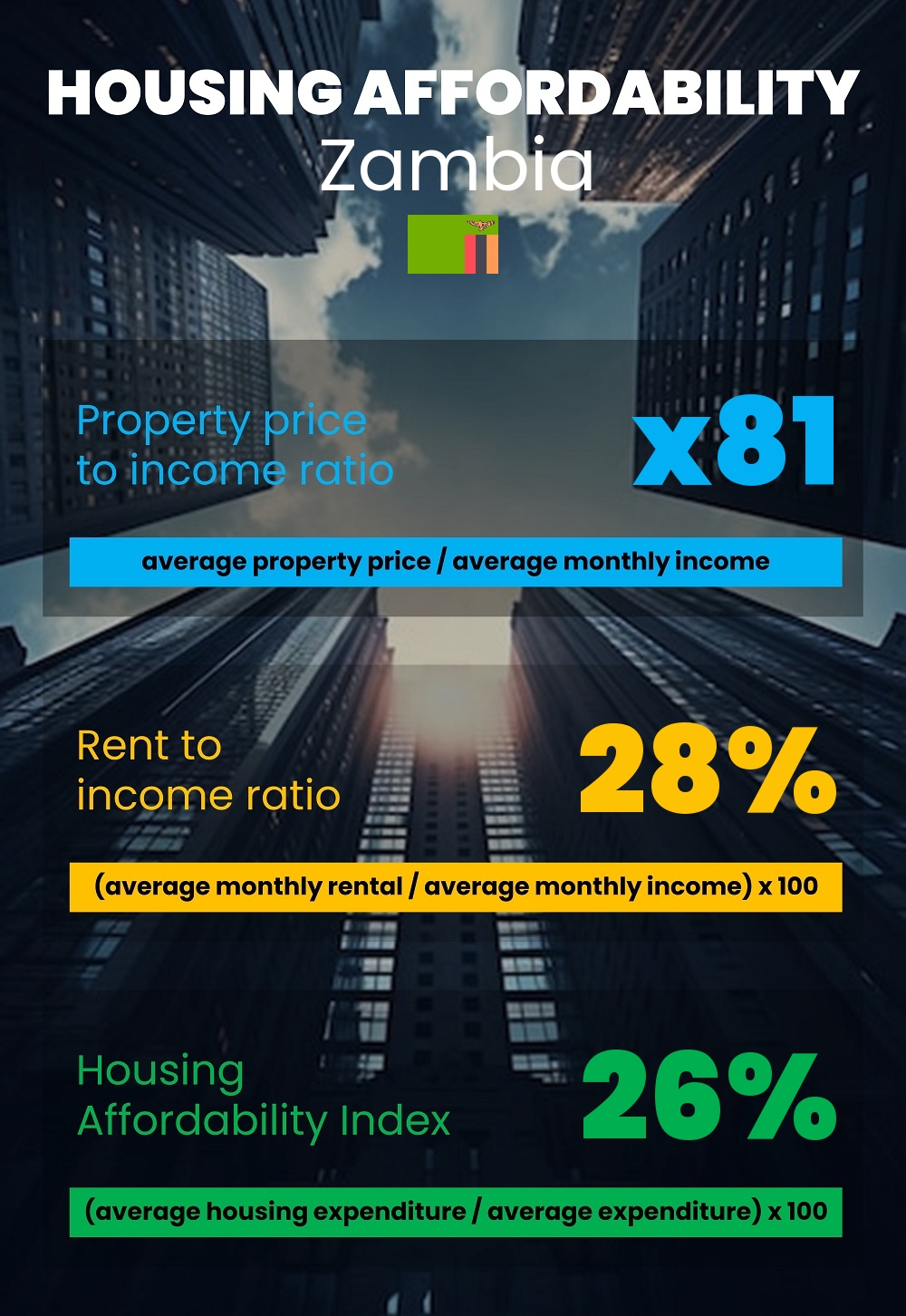
Housing costs, accommodation, and housing affordability in Zambia
Rental costs and house/apartment prices can vary drastically between different areas and locations.
Rent Cost in Zambia
Monthly Rent Prices

Studio apartment monthly rent cost
| 500 ZMW | 750 ZMW | 2,000 ZMW |

1-bedroom apartment monthly rent cost
| 750 ZMW | 1,200 ZMW | 3,000 ZMW |

2-bedroom apartment monthly rent cost
| 1,000 ZMW | 1,500 ZMW | 4,000 ZMW |

3-bedroom apartment monthly rent cost
| 1,200 ZMW | 2,000 ZMW | 5,500 ZMW |
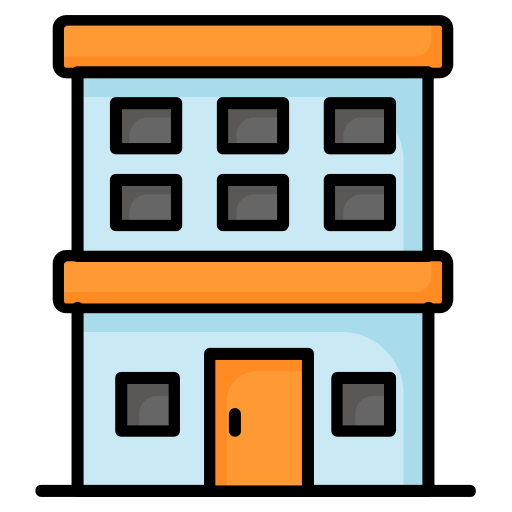
Furnished apartment monthly rent cost
| 2,400 ZMW | 6,000 ZMW | 12,000 ZMW |
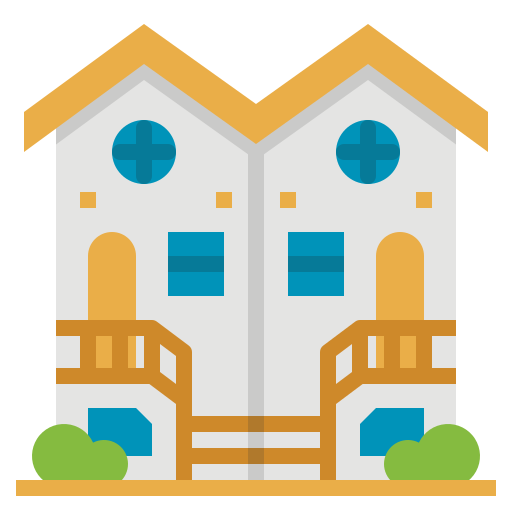
Townhouse monthly rent cost
| 2,000 ZMW | 3,000 ZMW | 8,600 ZMW |

House monthly rent cost
| 2,400 ZMW | 6,000 ZMW | 12,000 ZMW |
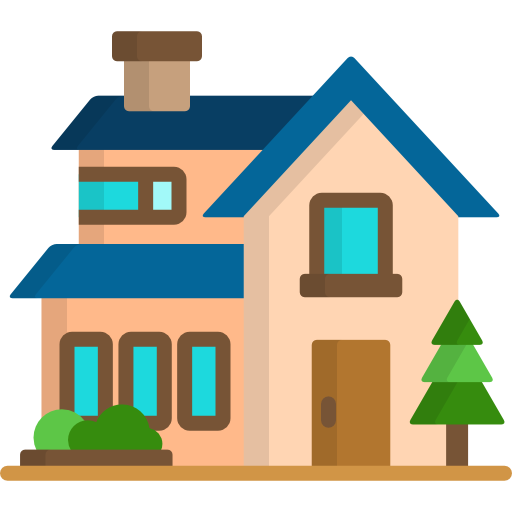
Villa monthly rent cost
| 3,000 ZMW | 7,500 ZMW | 12,000 ZMW |
The monthly rental cost of a studio apartment in Zambia ranges between 500 ZMW and 2,000 ZMW, meanwhile the cost of monthly rental of a one-bedroom apartment can be anywhere from 750 ZMW to 3,000 ZMW. Two-bedroom rentals rate ranges between 1,000 ZMW and 4,000 ZMW per month. The monthly rental for a three-bedroom apartment ranges from 1,200 ZMW to 5,500 ZMW. The average rent of a townhouse in Zambia is around 3,000 ZMW while house rental costs can be as high as 6,000 ZMW per month. Finally, if you want to rent a villa, expect to pay anywhere from 3,000 ZMW to 12,000 ZMW per month.
Apartment and house prices in Zambia
Cost of buying a property

Studio apartment price
| 100,000 ZMW | 150,000 ZMW | 300,000 ZMW |

1-bedroom apartment price
| 120,000 ZMW | 200,000 ZMW | 750,000 ZMW |

2-bedroom apartment price
| 200,000 ZMW | 600,000 ZMW | 1.2M ZMW |

3-bedroom apartment price
| 670,000 ZMW | 1M ZMW | 3M ZMW |

Townhouse price
| 860,000 ZMW | 2M ZMW | 7.5M ZMW |

House price
| $42,000 | $250,000 | $360,000 |

Villa price
| 1.2M ZMW | 6.7M ZMW | 10M ZMW |
| $50,000 | $280,000 | $420,000 |
The average price of a studio apartment in Zambia can range from 100,000 ZMW to 300,000 ZMW depending on location. One bedroom cost can be anywhere from 120,000 ZMW to 750,000 ZMW. A villa can cost you 6.7M ZMW on average with prices ranging from 1.2M ZMW to 10M ZMW.
If you're leasing or purchasing, housing costs in Zambia will probably constitute your biggest expenditure, yet it's an area where you wield considerable influence. This is due to the substantial variance in housing prices across communities. Keep in mind the location of your workplace and the accessibility of essential amenities to prevent negating the savings from lower rental rates with increased transportation expenses.
House / apartment prices to income ratio
Property price to income ratio
( average property price / average monthly income ) x 100
| 29 | x81 monthly income | 189 |
Property prices in Zambia can be x81 to x189 multiples of the monthly income depending on the property and the income of the person. On average, property prices are approximately x81 multiples of the average monthly salary in Zambia.
Rent to income ratio
Rent to income ratio
( monthly rental / monthly income ) x 100
The average rent-to-income ratio in Zambia is around 28%. This means that people pay 28% of their income for rent. Those figures can range from 18% to 38% depending on the salary, location, and type of property.
The housing-to-income ratio is a very important metric to evaluate and measure how affordable living is in a particular area, city, or country since housing comprises the biggest chunk of expenditure. A higher housing to income ratio means that the place is relatively expensive. The figure by itself does tell much. It only starts to make sense when comparing the housing to income ratio across different locations.
Housing affordability index
The housing affordability index measures how affordable accommodation is in a particular place. This can measured in multiple ways, the most common being housing expenditure to total expenditure ratio and the rent to income ratio. The housing expenditure ratio is a figure reported by individuals on the percentage they allocate for housing. Rent to income ratio is calculated by dividing the average monthly rent by the average income. Because these values are both percentages, we can find their average and get the best of the two worlds.
Housing Affordability Index
26% Property Taxes
Real estate owners pay property taxes to local tax authorities, which are determined by the assessed value of their property. Typically, these taxes are paid once a year. Property tax funds contribute to community development, financing infrastructure improvements, public services, and local education initiatives.
Home Maintenance Costs
Home maintenance costs encompass various expenses associated with the upkeep and repair of a residence. These expenditures include regular tasks such as lawn care, pest control, and HVAC system servicing, as well as occasional repairs and renovations like fixing leaks, painting, or replacing appliances.
Urban vs. rural living costs
Urban living typically entails higher housing and transportation costs due to demand and limited space, while rural areas generally offer lower housing expenses but may have higher prices for goods and services. The differnce in rental rates between urban areas and rural areas can be as high as 300% in some cases.
Emergency Funds For Students
An emergency fund is a financial safety net comprised of easily accessible savings set aside to cover unexpected expenses or financial emergencies, typically amounting to three to six months' worth of living expenses. We asked students whether they have an emergency fund and the answers were as follows.
Yes40%
No60%
Based on the survey, 60% of the students living in Zambia said that they don't have an emergency fund while 40% said that they do.
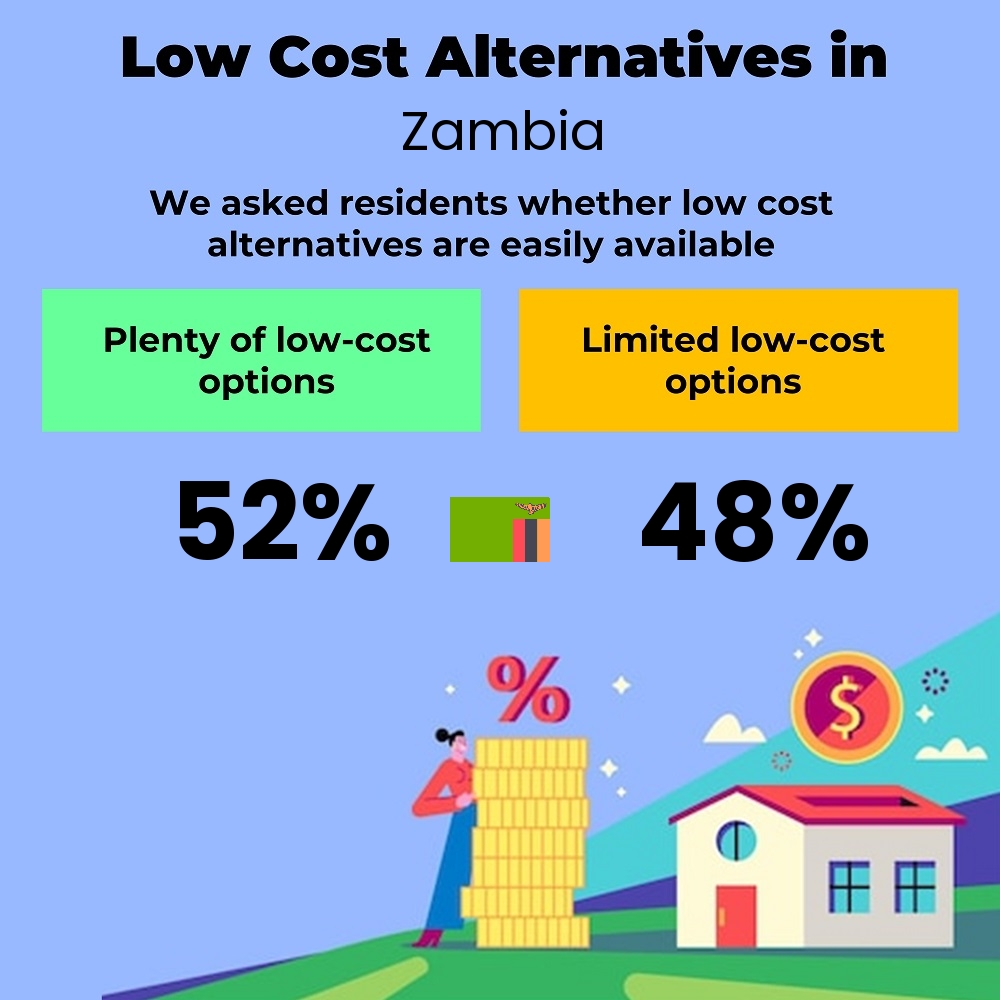
Low-cost alternatives in Zambia
People are always looking for ways to cut down expenses and reduce expenditures. The hallmark of any affordable place is the availability of discount stores, bargain deals, smart or secondhand shopping, refurbished items, and couponing. We asked students how easily cost-cutting is and the answers were distributed as follows:
Plenty of low-cost options52%
Few low-cost options48%
Based on the survey, 52% of the students living in Zambia have no problem finding low-cost alternatives to support a frugal lifestyle while 48% think that thriftness is difficult due to scarcity in discount markets and secondhand outlets.
Monthly costs and expenses of energy and basic utilities in Zambia
Utilities expenditure can vary slightly between different areas and locations.
Energy, electricity, water, gas, internet, and mobile cost in Zambia

Utility Bill Cost / Electricity + Water + Gas / Student

Internet and cable cost

Mobile phone bill and charges
Because most utility bills club electricity, water, and gas costs in one bill, we can't provide a breakup for each type of utility and will display electricity, gas, and water as single cost.
The average monthly energy and water consumption of students is around 120 ZMW. The cost of internet and WiFi ranges from 30 ZMW to 80 ZMW with 60 ZMW being the average internet bill. Finally, the average monthly mobile charges is around 40 ZMW but can range between 24 ZMW and 120 ZMW depending on consumption. Mobile charges include both calling minutes as well as data packages.
Energy / Utility expense to income ratio
( monthly utility expenses / monthly income ) x 100
The average utility-to-income ratio in Zambia is around 7%. This means that people pay 7% of their income for energy, water, internet, and mobile charges. Those figures can range from 4% to 11% depending on salary and location.
Food Prices, Dining Expenses, and Grocery Costs in Zambia
Grocery / Food expenditure and prices can vary drastically between different areas and locations.
Prices and cost of goods and services in Zambia
Dining out, food, and beverages costs. Price variations for common food items.

Fast food combo meal price
The average price of a regular combo meal at a fast food outlet or chain like McDonald's, Pizzahut, or KFC in Zambia is approximatly 12 ZMW with meal cost ranging from 6 ZMW to 20 ZMW. The typical combo meal consists of a burger, french fries, and a drink.

Restaurant meal for one price
If you are planning to have a nice meal at a mid-range restaurant, expect to pay anywhere between 20 ZMW and 60 ZMW with 30 ZMW being the average price of a plate for one person at a regular restaurant in Zambia.

Fine dining meal for one price
The price range of a meal at fine-dining restaurant is 40 ZMW to 240 ZMW with the average cost being 60 ZMW for one person. This is what you would expect to pay a top-tier diner in Zambia.

Beverage prices, cappuccino, latte etc..
The average price of a regular beverage like cappuccino or latte at Starbucks, Costa, or similar coffee shops and cafes in Zambia is around 8 ZMW. Price ranges between 5 ZMW and 12 ZMW depending on the type of beverage, the size, and optional add-ons.
Grocery and market costs

Large bottle of milk price
The average price of a large bottle of milk in Zambia is 4.8 ZMW. The maximum what you would pay for milk is 6 ZMW and the minimum being 4 ZMW depending on the brand of milk and other properties.

12 eggs price
A dozen eggs costs around 4 ZMW on average with 3 ZMW and 6 ZMW being the lower and upper limits respectively.

Fresh whole chicken price
The price range of a fresh whole chicken in Zambia is between 6.8 ZMW and 13 ZMW depending on the size of the chicken and whether it is oraganic or not. The average price is approximatly 8.9 ZMW.

Pack of beef price
The price of a regular pack of beef or meat is around 12 ZMW. A pack of beef contains around 1Kg or 1lb depending on packing.

Medium bag of rice price
A bag of rice in Zambia costs around 4.4 ZMW on average with prices rangeing between 3.2 ZMW and 6.3 ZMW depending on the brand and quality.

Bag of tomatos price
A bag of tomatoes costs anywhere from 1.2 ZMW to 3 ZMW. A bag of tomatoes denotes 1Kg or 1lb depending on location.

Bag of apples price
A bag of apples costs 2.8 ZMW on average. A bag of apples denotes 1Kg or 1lb depending on location.
Expenditure on food and grocery for students
Students' spending on grocery ranges from 94 ZMW to 6,900 ZMW with the location, income, and size of the student being the most determinite factors.
Published: June 19, 2024 Last Update: January 14, 2026


























































































